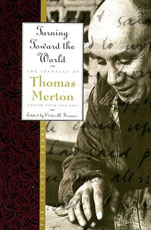Edited by Victor K. Kramer, this book contains insights into the Trappist monk's interest in Eastern religion, ecumenism, nonviolence, monastic solitude, and the natural world. Throughout these journal pages, Thomas Merton demonstrates his truly "Catholic" ability to enter into dialogue with other religious leaders, authors from other centuries, and texts provided by the natural world. For instance, at one time he describes listening to "a talkative fire in the fireplace" and in another place characterizes a sunset as "an event that calls forth solemn music in the very depths of one's being." Merton struggles with his own productivity and at one point writes, "Afternoons for nothing. For cutting away all that is practical. Learn to wash your cup and give rise to nothing." Merton's a marvel-always attuned to the presence of God.
Turning Toward the World The Pivotal Years - The Journals of Thomas Merton, Volume 4, 1960-1963
Insights into the Trappist monk's interest in Eastern religion, ecumenism, nonviolence, monastic solitude, and the natural world.
